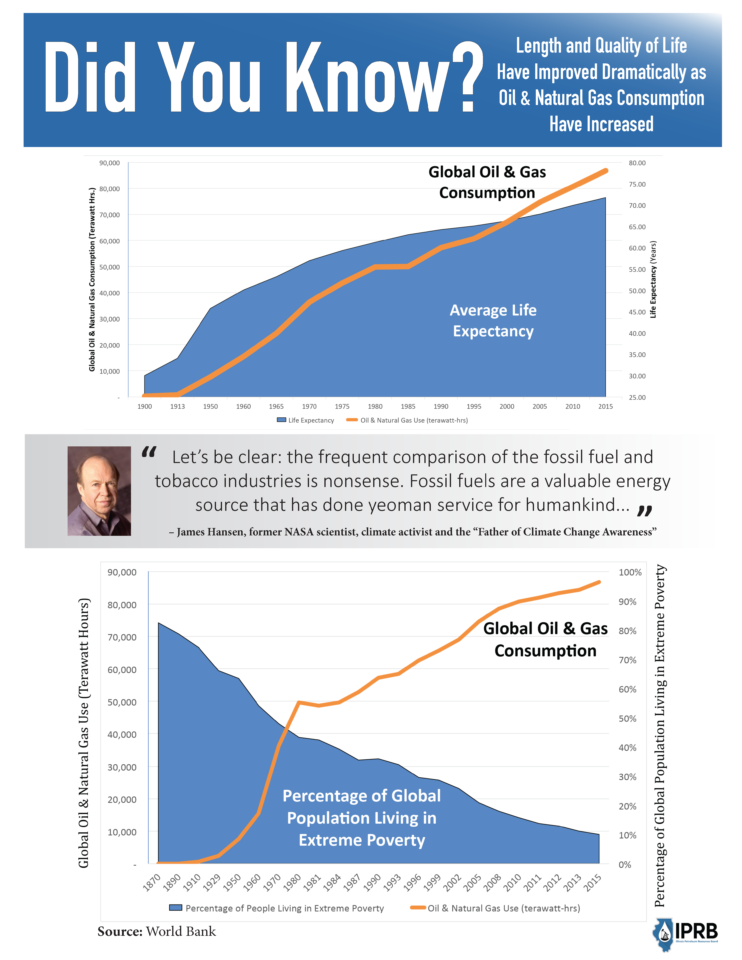Benefits of Fossil Fuels to Humanity Have Far Outweighed Negatives
The Natural Resources Defense Council claims fossil fuels have “exacted an enormous toll on humanity.” It is a belief shared and amplified by millions of “Keep It In the Ground” activists. But there are actually billions of examples why that opinion couldn’t be further from the truth. Eight billion, to be specific.
That latter figure happens to be the earth’s current population – eight times the amount of people that resided on the planet 200 years ago.
Prior to the wide-scale use of oil, natural gas and coal to make the high standard of living we enjoy today possible, eight out of 10 people lived in extreme poverty and most folks didn’t make it past their 30th birthday. As the Brookings Institute’s Samantha Gross recently wrote, “The pre-fossil era was not the utopia we envision.” Instead, it was rather miserable for a vast majority of the world’s occupants, most of which died far too young.
Fast forward a couple centuries, and the average person now lives more than 70 years and less than one in 10 people live in extreme poverty – the lowest level in human history. There has never been a better time to be alive. And it’s no coincidence fossil fuel use grew from almost nothing to 80-plus percent of the world’s energy supply over the past 200 years.
Contrary to the Natural Resources Defense Council’s claim that fossil fuels have “exacted an enormous toll on humanity,” the fossil fuel age has actually allowed humanity to flourish in unprecedented fashion. The examples why are almost too numerous to count.
Fossil fuels provide heat during the cold winter months, air conditioning during sweltering summer months and reliable electricity year-round. They have allowed access to healthcare via improved mobility, as well as medicines and petroleum-based healthcare products. They allow improved health in general by providing plentiful food, drinking water treatment and sewage management. These modern conveniences have improved the quality of life in the United States and other fortunate developed countries, leading directly to increased economic opportunity and longer lives, in general.
Even James Hansen, widely known as the father of global warming awareness, has said, “Let’s be clear: the frequent comparison of the fossil fuel and tobacco industries is nonsense. Fossil fuels are a valuable energy source that has done yeoman service for humankind.”

To be clear, fossil fuels, like all sources of energy, have environmental impacts. But it is dangerously misleading to focus exclusively on those impacts and completely ignore their massive benefits. And using this deeply flawed framing as the basis of campaigns to rapidly eliminate the source of 83 percent of the world’s energy and virtually all our modern products is even more dangerous considering the favored “alternatives” are completely inadequate to replace fossil fuels.
It can’t be emphasized enough that renewable energy – specifically wind and solar – can only generate electricity, and do so only when the sun is shining and the wind is blowing.
Wind and solar are not only unreliable for power generation, they provide no replacement for the thousands of uses for petroleum that are essential and largely taken for granted. More than 6,000 everyday products, including dozens of electronics such as smart phones and computers, are largely petroleum-based. Petrochemicals are even needed to manufacture wind turbines, solar panels and more than 70 percent of the typical electric car. As Vanclav Smil, Distinguished Professor Emeritus at the University of Manitoba, recently wrote in TIME magazine, each of the four pillars of modern civilization – ammonia fertilizer produced from natural gas, plastic, steel and cement – could not exist without fossil fuels.
Simply stated, if oil, natural gas and coal were rapidly eliminated as “Keep It In the Ground” groups such as the Natural Resources Defense Council advocate for, the voids created would be far worse than the issues fossil fuels create. That said, focus should center on pragmatically reducing emissions via technologies such as carbon capture and diversifying our energy supply will all forms of energy rather than irrationally eliminating fossil fuels before viable alternatives are available. Stubbornly insisting on the latter would actually take an “enormous toll” on the flourishment of humanity fossil fuels have made possible.
